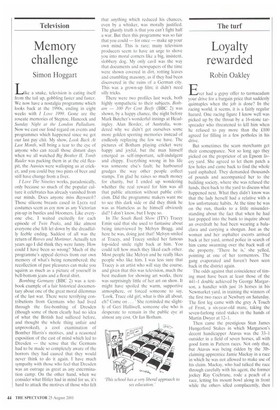Memory challenge
Simon Hoggart
LIke a snake, television is eating itself from the tail up, gobbling faster and faster. We now have a nostalgia programme which looks back at the 1990s, ending in eight weeks with I Love 1999. Gone are the roseate memories of Steptoe, Hancock and Sunday Night at the London Palladium. Now we cast our fond regard on events and programmes which happened since we got our last pay chit. My show, Look Back At Last Month, will bring a tear to the eye of anyone who can recall those distant days when we all watched Big Brother II, Tomb Raider was packing them in at the old fleapit, the Aussies were walloping us at cricket, and you could buy two pints of beer and still have change from a fiver.
I Love The Nineties works, paradoxically, only because so much of the popular culture it celebrates has already vanished from our minds. Does anyone miss Bavwatch? Those silicone breasts cased in Lycra red costumes seem as coy now as any Victorian pin-up in bustles and bloomers. Like everyone else, I waited excitedly for each episode of Twin Peaks, and like almost everyone else felt let down by the dreadfully feeble ending. Saddest of all was the return of Reeves and Mortimer. Actually ten years ago I did think they were funny. How could I have been so wrong? Much of the programme's appeal derives from our own memory of what's being remembered; the recollection of past pleasures can make you squirm as much as a picture of yourself in bell-bottom jeans and a floral shirt.
Bombing Germany (BBC 2) was a textbook example of a fair historical documentary about one of the great moral dilemmas of the last war. There were terrifying contributions from Germans who had lived through the fire-bombing of Dresden (though some of them clearly had no idea of what the British had suffered before, and thought the whole thing unfair and unprovoked), a cool examination of Bomber Harris's motives, and a reasoned exposition of the cast of mind which led to Dresden — the sense that the Germans had to be made so completely aware of the horrors they had caused that they would never think to do it again. I have much sympathy with those who feel that Dresden was an outrage as great as any extermination camp. On the other hand, when we consider what Hitler had in mind for us, it's hard to attack the motives of those who felt that anything which reduced his chances, even by a whisker, was morally justified. The ghastly truth is that you can't fight half a war. But then this programme was so fair that you could — for once — make up your own mind. This is rare; many television producers seem to have an urge to shove you into moral corners like a big, insistent, slobbery dog. My only cavil was the way that documents and newspapers of the time were shown covered in dirt, rotting leaves and crumbling masonry, as if they had been discovered in the ruins of a German city. This was a grown-up film; it didn't need silly tricks.
There were two profiles last week, both highly sympathetic to their subjects. Botham — 100 Per Cent Beefy (BBC 2) was shown, by a happy chance, the night before Mark Butcher's wonderful innings at Headingley. Alan Border, of Australia, wondered why we didn't get ourselves some more golden sporting memories instead of endlessly replaying the few we have. The pictures of Botham playing cricket were happy and joyful, but the man himself emerged as self-important, self-indulgent and chippy. Everything wrong in his life was someone else's fault; he harboured grudges the way other people collect stamps. I'm glad he raises so much money for charity, but I ended up wondering whether the real reward for him was all that public attention without public criticism. Did the programme makers want me to see this dark side or did they think he was as blameless as he himself obviously did? I don't know, but I hope so.
In The South Bank Show (ITV) Tracey Emin said that she used to fantasise about being interviewed by Melvyn Bragg, and here he was, doing just that! Melvyn smiled at Tracey, and Tracey smiled her famous lop-sided smile right back at him. You could tell how much they liked each other. Most people like Melvyn and he really likes people who like him. I was less sure that Tracey is an artist who will stay the course, and given that this was television, much the best medium for showing art works, there was surprisingly little of her art on show. It might have spoiled the warm, supportive atmosphere, or forced someone to say, 'Look, Trace old girl, what is this all about, eh? Come on ... ' She reminded me slightly of Geri Halliwell, someone else who is desperate to remain in the public eye at almost any cost. Or Ian Botham.


























































 Previous page
Previous page